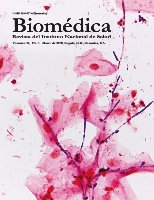
Biomedica
Scope & Guideline
Pioneering research at the intersection of biology and medicine.
Introduction
Aims and Scopes
- Interdisciplinary Biomedical Research:
The journal emphasizes research that integrates various biomedical disciplines, including clinical medicine, public health, and environmental health, reflecting the interconnectedness of these fields. - Epidemiology and Public Health:
A core focus is on epidemiological studies that assess health determinants, disease prevalence, and health outcomes in various populations, particularly in Latin America. - Infectious Diseases and Pathogens:
Research on infectious diseases, including studies on their molecular characterization, epidemiology, and treatment, is a significant area of publication. - Chronic Diseases and Non-communicable Diseases:
The journal publishes studies on chronic diseases, their risk factors, management, and the impact of social determinants on health outcomes. - Health Policy and Ethics:
There is a consistent focus on health policy, ethics, and the social implications of health research, particularly in the context of Colombian and Latin American health systems. - Innovative Diagnostic and Therapeutic Approaches:
Biomedica showcases research on novel diagnostic tools and therapeutic strategies, including technology-driven solutions in healthcare.
Trending and Emerging
- Impact of Environmental Factors on Health:
There is a growing focus on how environmental factors, such as pollution and climate change, affect health outcomes, particularly in vulnerable populations. - Mental Health and Social Determinants:
Research exploring the intersection of mental health with social determinants is on the rise, emphasizing the importance of understanding mental health in broader public health contexts. - COVID-19 Related Research:
The pandemic has spurred a significant increase in research related to COVID-19, including studies on its epidemiology, clinical management, and long-term impacts on health. - Telemedicine and Digital Health Innovations:
Emerging themes include the role of telemedicine and digital health solutions in improving access to care and managing chronic diseases, reflecting changes in healthcare delivery. - Genomic and Molecular Epidemiology:
There is an increasing emphasis on genomic and molecular epidemiology, particularly in understanding the dynamics of infectious diseases and resistance patterns.
Declining or Waning
- Traditional Parasitology Studies:
Research specifically focused on traditional parasitology has decreased, possibly due to the evolving nature of health challenges that require broader interdisciplinary approaches. - Basic Laboratory Techniques in Isolation and Identification:
There is less emphasis on basic laboratory techniques for pathogen isolation and identification, as the field moves towards more advanced molecular and genomic methods. - Historical Public Health Practices:
Studies examining historical public health practices and their implications have waned, reflecting a shift towards contemporary issues and innovative solutions. - Single Disease Focus Research:
Research that concentrates solely on single diseases without considering broader health determinants or comorbidities is becoming less common, as interdisciplinary approaches gain prominence.
Similar Journals

Biomolecules and Biomedicine
Empowering Discovery in Biochemistry and Biomedical SciencesBiomolecules and Biomedicine is a pioneering open-access journal dedicated to advancing the fields of molecular biology and biomedical sciences, published by the Association of Basic Medical Science Federation Bosnia & Herzegovina in Sarajevo. With the ISSN 2831-0896 and the E-ISSN 2831-090X, this journal aims to facilitate the dissemination of high-quality research from 2023 onwards, inviting submissions that provide innovative insights and findings across various facets of medicine and biological sciences. Positioned within the General Medicine and Biochemistry, Genetics and Molecular Biology categories, it currently holds rankings of 332 out of 636 and 173 out of 221 respectively, highlighting its emerging influence in these fields. As an open-access journal, it ensures that all published research is freely accessible to a global audience, fostering collaboration and knowledge exchange among researchers, professionals, and students alike. With a commitment to enhancing scientific discourse and promoting cutting-edge research, Biomolecules and Biomedicine is poised to become a vital resource for those dedicated to unraveling the complexities of biomolecules and their roles in health and disease.
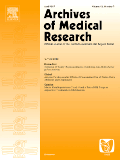
ARCHIVES OF MEDICAL RESEARCH
Exploring the frontiers of medicine, one study at a time.Archives of Medical Research is a prestigious scholarly journal dedicated to advancing the field of medicine through the dissemination of high-quality research findings. Published by Elsevier Science Inc., this esteemed journal has garnered significant recognition, boasting a remarkable impact factor and ranking in the top quartile (Q1) of its category, specifically in General Medicine with a Scopus rank of #30 out of 636 journals, placing it in the 95th percentile. Since its inception in 1992, Archives of Medical Research has served as a critical platform for researchers and professionals to share innovative insights and empirical studies that address pressing medical issues and enhance clinical practices. The journal welcomes a range of submissions, ensuring a diverse array of topics that reflect the latest trends and developments in medicine. As the journal continues to push the boundaries of medical research until at least 2025, it remains an essential resource for students, academics, and healthcare professionals striving to make a meaningful impact in the medical community.
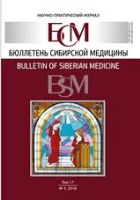
Byulleten Sibirskoy Meditsiny
Connecting Innovators in Biomedical SciencesByulleten Sibirskoy Meditsiny, published by the Siberian State Medical University, is a pivotal open-access journal in the field of Molecular Medicine, with its current edition indexed under the ISSN 1682-0363. Since its transition to open access in 2013, the journal aims to disseminate high-quality research and advancements in biomedical sciences, particularly focusing on molecular mechanisms and therapeutic interventions. Despite its relatively recent recognition in Molecular Medicine, where it ranks in the 6th percentile, the journal is dedicated to fostering knowledge exchange and collaboration among researchers, professionals, and students alike. With a modest impact factor and quarterly publication, Byulleten Sibirskoy Meditsiny is positioned to serve as a valuable resource for those engaged in the intricate realms of molecular biology, biochemistry, and general medicine, contributing to the broader scientific discourse in the Russian Federation and beyond.

Immuno
Fostering Global Collaboration in Immune ResearchWelcome to Immuno, a pioneering open-access journal published by MDPI that serves as a key platform for the dissemination of innovative research in the fields of immunology, biochemistry, and genetics. Established in 2021, this journal has rapidly established itself within the academic community, currently ranking in the 53rd percentile in Medicine (miscellaneous) and 50th percentile in Biochemistry, Genetics, and Molecular Biology according to Scopus metrics. With a commitment to advancing our understanding of immune mechanisms and their applications in health and disease, Immuno is dedicated to publishing high-quality peer-reviewed articles that contribute valuable insights to both researchers and practitioners. Positioned in the heart of Switzerland, its global accessibility and diverse editorial board are a testament to its aim to promote knowledge exchange among scientists, practitioners, and students alike. Explore the latest discoveries and advancements in immunological research through Immuno, where your contributions help shape the future of this critical area of study.

BRITISH JOURNAL OF BIOMEDICAL SCIENCE
Unlocking the Future of Biomedical Science Through Open AccessBRITISH JOURNAL OF BIOMEDICAL SCIENCE is a distinguished peer-reviewed journal dedicated to publishing high-quality research in the field of biomedical science. Published by FRONTIERS MEDIA SA, this journal aims to advance knowledge in essential disciplines such as biochemistry, immunology, microbiology, and infectious diseases. Since its inception in 1993, the journal has maintained a solid reputation, achieving notable rankings across multiple Scopus categories, including Q2 in Biochemistry (medical) and Q3 in Clinical Biochemistry and Infectious Diseases. With an emphasis on open access, it facilitates the widespread dissemination of scientific knowledge, ensuring that researchers, professionals, and students can access cutting-edge studies and findings essential for driving innovation in medical and clinical practices. The journal's rigorous editorial standards and commitment to scientific excellence make it an invaluable resource for anyone looking to stay at the forefront of research in biomedical sciences.
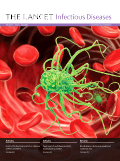
LANCET INFECTIOUS DISEASES
Connecting Researchers to Combat Global Health ThreatsLANCET INFECTIOUS DISEASES is a premier journal published by Elsevier Science Ltd, dedicated to disseminating high-quality research and comprehensive reviews in the field of infectious diseases. Since its inception in 2001, the journal has become a pivotal resource in the medical community, recognized for its rigorous peer-review process and impactful contributions to public health. With an impressive Scopus rank of #2 out of 344 in the category of Medicine - Infectious Diseases, it consistently ranks in the 99th percentile, highlighting its importance and influence in shaping clinical and epidemiological research. The journal's commitment to advancing knowledge in infectious diseases is underscored by its Q1 quartile designation in 2023, affirming its status as a leading academic outlet. Although not an open-access journal, LANCET INFECTIOUS DISEASES provides essential insights for researchers, healthcare professionals, and students, bridging the gap between cutting-edge research and practical application in an increasingly interconnected world.
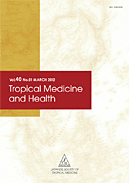
Tropical Medicine and Health
Connecting researchers to combat tropical diseases effectively.Tropical Medicine and Health is a prestigious open-access journal published by BMC that serves as a vital platform for researchers and health professionals focusing on the fields of tropical medicine, infectious diseases, and public health. With an ISSN of 1348-8945 and an E-ISSN of 1349-4147, the journal has established itself in the academic community since its inception in 2004, bridging the gap between research and real-world applications in managing tropical diseases. Recognized for its quality, it holds a commendable Q2 ranking in both the Infectious Diseases and Public Health, Environmental and Occupational Health categories, positioned in the 2023 Scopus rankings within the 85th and 74th percentiles, respectively. Researchers can access high-quality, peer-reviewed articles that contribute significantly to advancing knowledge in the field. With a commitment to fostering open scientific dialogue, Tropical Medicine and Health is not just a journal, but a collaborative space for researchers, students, and practitioners working to improve health outcomes in tropical regions worldwide.

Global Health Research and Policy
Connecting research and policy for global impact.Global Health Research and Policy, published by BMC, is a leading open-access journal dedicated to advancing the field of global health through impactful research and policy analysis. Since its establishment in 2016, the journal has garnered a prestigious reputation, achieving a Q1 ranking across several categories including Epidemiology, Health Policy, Health (social science), and Public Health, Environmental and Occupational Health in 2023. With an E-ISSN of 2397-0642, this UK-based journal ensures the dissemination of high-quality research to a global audience, promoting accessibility and collaboration. The open-access model facilitates the sharing of knowledge and innovation essential for addressing pressing health challenges worldwide. Researchers, professionals, and students alike will find valuable insights and relevant policy discussions in each issue, making Global Health Research and Policy a vital resource for those committed to improving health outcomes on a global scale.
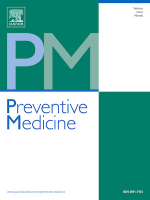
Preventive Medicine
Shaping tomorrow's public health through rigorous research.Preventive Medicine is a premier academic journal published by Academic Press Inc Elsevier Science, renowned for its influential contributions to the fields of Epidemiology and Public Health. Since its inception in 1946 and through its dedicated issues leading into 2024, the journal has established itself as a leading platform for cutting-edge research, boasting impressive Scopus rankings, with a notable Q1 status across relevant categories. This journal provides an essential forum for scholars, practitioners, and policy-makers interested in the prevention of diseases and the promotion of health within populations. With each issue, it disseminates valuable insights on preventive strategies, health behaviors, and epidemiological trends, making it crucial for anyone invested in the advancement of public health sciences. The journal does not offer open access options, ensuring that content remains relevant and targeted to its scholarly audience. Given its valuable contributions and recognition in the academic community, Preventive Medicine continues to play a pivotal role in shaping evidence-based approaches to health promotion and disease prevention in modern societal contexts.
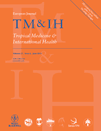
TROPICAL MEDICINE & INTERNATIONAL HEALTH
Advancing global health through innovative research.Tropical Medicine & International Health is a distinguished journal published by Wiley, dedicated to the exploration and dissemination of cutting-edge research in the fields of infectious diseases, parasitology, and public health. With a robust open-access option, the journal facilitates the widespread sharing of information critical to addressing health issues in tropical and international settings. Since its inception in 1996, it has established a significant presence in the academic community, as indicated by its impressive ranking in various Scopus categories, notably positioned in the Q1 quartile for Parasitology and Q2 for both Infectious Diseases and Public Health, reflecting its high influence within these domains. The journal's commitment to advancing knowledge on health challenges prevalent in tropical environments makes it an invaluable resource for researchers, healthcare professionals, and students alike who are dedicated to improving global health outcomes.